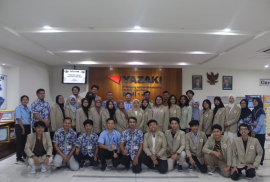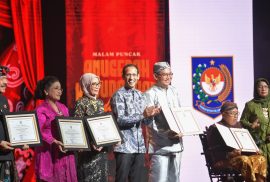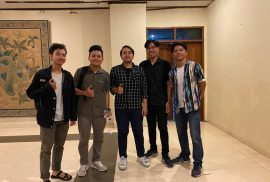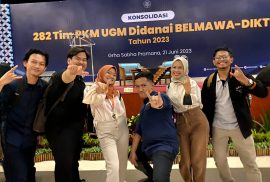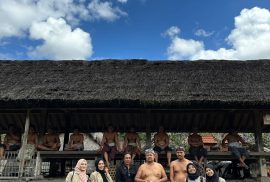Jepara, (01/11/2023). A total of 25 sixth and eighth-semester students taking the Professional Japanese Language course in the Japanese Language and Culture Study Program at, the Faculty of Cultural Sciences, Gadjah Mada University visited PT. Autocomp Manufacturing Indonesia Jepara Semarang Factory (PT SAMI JF) on Jl. Raya Jepara – Kudus, Sengonbugel, Kab. Mayong, Jepara Regency, Central Java on Friday 1 December 2023. PT SAMI JF is a Japanese PMA under the Yazaki Indonesia Group which is affiliated with Yazaki Corporation, Japan. PT SAMI JF operates in the automotive components industry, namely the production of electrical distribution systems (wiring harnesses) for motor vehicles, especially cars.
This field study is part of the Professional Japanese course in the form of a visit to Japanese industry which aims to introduce students to the world of work, especially the culture and work ethic in the Japanese manufacturing industry directly. After 1-semester students study Japanese communication patterns and business ethics in lectures, at the end of the lecture students are invited to see and experience firsthand the world of work related to the Japanese language, especially in Japanese companies in Indonesia.
The group of students from the Japanese Language and Culture Study Program was received by the Vice President of PT SAMI JF Hidehisa Kurihara and Factory Manager Kazuhiro Fujita along with several staff. On this occasion, Kurihara welcomed this visit event positively and provided the widest possible opportunity for students to learn and gain experience through this activity. He also opens opportunities for students who want to do internships or apprenticeships at his company before graduating from college.
The visit began with remarks from Mr Kurihara, followed by a presentation about PT SAMI JF by Bagus Kusuma Putra as Senior Manager, as well as an explanation of the work ethic and ups and downs of working in Japanese companies by PT SAMI JF. Staff who are also UGM Japanese Literature alumni. Gantira Akbar and Muhammad Fatkul, followed by a visit to the factory area to see firsthand the production process at PT SAMI JF. During the visit to the factory, the group was divided into 4 teams guided by PT SAMI JF staff. After the break, Friday prayers, and lunch, the event continued with questions and answers, discussions and presentations by each team in Japanese regarding what they saw and observed as well as their message impressions during their visit to PT SAMI JF guided by the HRD Supervisor from PT Mrs. SAMI JF Listia. The event closed with judging and announcing the best student presenter team and continued with the presentation of prizes and group photos.
This visit activity was initiated by Stedi Wardoyo, S.S., M.A., and Najih Imtihani, S.S., M.A as course lecturers. The aim of this field visit activity is to encourage students to actively practice Japanese language skills for the business and professional world, as well as to provide concrete descriptions and information about the world of work, especially at Japanese companies in Indonesia. This field study activity was fully supported by the Head of the Japanese Language and Culture Study Program, Drs. Tatang Hariri, M.A., Ph.D. as one of the programs to support the Ministry of Research, Technology and Culture’s policy regarding Independent Learning Campuses and support the achievement of Main Performance Indicator (IKU) 1: Graduate Work Readiness and is also included in the SDGs indicators, namely SDGs 4 and 17: Quality Education and Partnerships to Achieve Goals. By referring to one form of implementation of Merdeka Belajar, students not only learn theoretically in class or on campus, but also go directly into the field to see, observe and experience directly the things they have learned during lectures. Furthermore, through this program it is hoped that it can bring closer, link and match between the academic world and the world of work, as well as provide input for the UGM Japanese Language and Culture Study Program to improve the learning process so that it is even better, able to produce graduates who are qualified and ready to work with good hard skills and soft skills expected by the business world.

